初一英语一般现在时讲解及练习
初中英语语法一般现在时专项讲解及总结练习

初中英语语法一般现在时专项讲解及总结练习初中英语时态专题解说一般此刻时一、出现以下状况是用一般此刻时:常常性、习惯性的动作或存在的状态。
时间标记词:often常常,usually往常,always老是,every每个,sometimes有时,at在几点钟e.g.Igotoschoolonfoot.Heisverybusynow.Ioftendomyhomeworkat7:00.HeusuallygoestotheparkonSundaymorning.表示主语的特点、性格、能力、喜好等。
e.g.Hecanswim. Iworkhard. IlikewatchingTV.表示客观真谛e.g.Therearesevendaysinaweek.Themoonmovesroundtheearth.二、一般此刻时的句式变化:1)表示动作,一般人称作主语的,变否认句须在动词前加助动词don’t;变一般疑问句须在句首加助动词do。
E.g.一定句Theyhavelunchat12:00.否认句Theydon’thavelunchat12:00.疑问句Dotheyhavelunchat12:00? 一定回答:Yes,theydo.否认回答:No,theydon’t.2)单三人称做主语的,变否认句须在动词前加助动词doesn’t;变一般疑问句须在句首加助动词does。
e.g.一定句:Hegoestoschoolbybike. 否认句:Hedoesn’tgotoschoolbybike.疑问句:Doeshegotoschoolbybike? 一定回答:Yes,hedoes.否认回答:No,hedoesn’t1.She______(go)toschoolatseveno ’clock.否认句:一般疑问句:2.Theyusually_____upat17:00.(get)否认句:一般疑问句:3.Amy____(be)herejustnow.否认句:一般疑问句:实质演练1.Ihavemanybooks. (改为否认句)doeshishomeworkathome.否认句:一般疑问句:usuallywaterstheflowers.1初中英语时态专题解说否认句:一般疑问句YangusuallywashessomeclothesonSaturday. 否认句:5.IusuallyplayfootballonFridayafternoon. 否认句:一般疑问句:加强训练一、写出以下单词的第三人称单数形式1.work______ ____read__________clean__________write__________2.teach_____ _____wash__________guess__________watch__________3.go________ __do_________ __4.study_____ _____fly__________cry__________play__________5.have__________二.选择)1._____youhaveaboo k?A.DoB.AreC.Is D.Have)2.They_________onafarm .workingB.isworkC.working D.isworked)3.DoesPeterliketowatchTV?__________.A.Yes,helike B.No,hedoesn’tC.Yes,he’dlike D.No,helikes)4.Shedo esn’t__________herhomeworkintheafter noon.A.doingB.todoC.doesD.d o)5.How____________Mr.Brown___________toAmerica?A.do,goB.is,goC.does,go )6.Where’smy camera?I____________it.A.amnotfinding B.amnotseeing C.can’tfindD.can’tl ookat)7.How___________hegotowork?He___________toworkbybike.A.does;g oB.do;goesC.do;go D.does;goes)8.______youusuallylateforschool?No,_____ ________.A.Do;IamB.Does;notC.Are;I’mnotD.Are;Iaren’t)9._____she_____homeatsixeveryday?A.Is,leave B.Does,leave C.Is,leavesD.Does,le ft)10.Mr.Yang____________Englishthisterm .A.teachesour B.teachesus C.teachsusD.teachou r三.用所给动词的适合形式填空。
(完整版)一般现在时和特殊疑问句讲解及练习
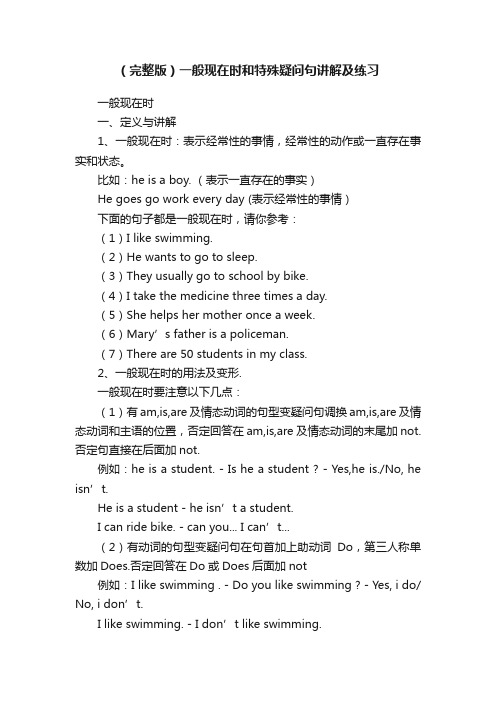
(完整版)一般现在时和特殊疑问句讲解及练习一般现在时一、定义与讲解1、一般现在时:表示经常性的事情,经常性的动作或一直存在事实和状态。
比如:he is a boy. (表示一直存在的事实)He goes go work every day (表示经常性的事情)下面的句子都是一般现在时,请你参考:(1)I like swimming.(2)He wants to go to sleep.(3)They usually go to school by bike.(4)I take the medicine three times a day.(5)She helps her mother once a week.(6)Mary’s father is a policeman.(7)There are 50 students in my class.2、一般现在时的用法及变形.一般现在时要注意以下几点:(1)有am,is,are及情态动词的句型变疑问句调换am,is,are及情态动词和主语的位置,否定回答在am,is,are及情态动词的末尾加not.否定句直接在后面加not.例如:he is a student. - Is he a student ? - Yes,he is./No, he isn’t.He is a student - he isn’t a student.I can ride bike. - can you... I can’t...(2)有动词的句型变疑问句在句首加上助动词Do,第三人称单数加Does.否定回答在Do或Does后面加not例如:I like swimming . - Do you like swimming ? - Yes, i do/ No, i don’t.I like swimming. - I don’t like swimming.(3)第三人称单数在动词的末尾要加s或es,以s,ch,sh结尾的单词加es,特殊单词特殊记.例如:He goes to school at 7:00 every day.要特别注意在什么情况要使用一般现在时.现在请你完成一些练习,让你更熟练地掌握一般现在时:(一).用动词的适当形式填空1. She _________(go) to school at seven o’clock.3. He usually ___________ up at 17:00.(get )4. She ___________ (live) in Beijing.7. My father __________ (watch) TV every evening .9.________ Amy _________ (read) English every day10. Chen Jie sometimes _________(go)to the park with her sister.(二).选择填空1.I want____homework now.A. doingB. to doC. to do myD. do my2.It's time______.A. go to schoolB. play gamesC. to go homeD. to do my homeworks3.______go and help her.A. Let's meB. Let's usC. Let'sD. Let's to4.Do they have a new car? Yes,_____.A .they are B.they have C. they don't D. they do5.He often _________ supper at 6:00 in the evening.A. haveB. has c. is having D. is eating6. We _____________ any Chinese classes on Friday.A. are havingB. aren’t havingC. don’t haveD. are have(三)、用括号内动词的适当形式填空。
英语一般现在时解题技巧及练习题(含答案)及解析
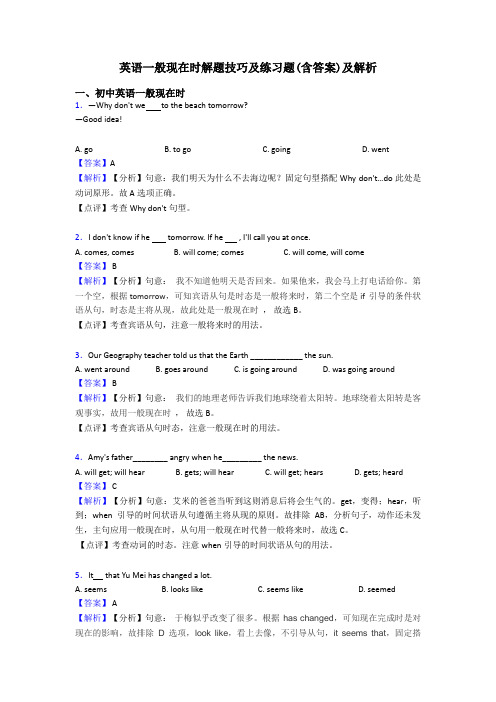
英语一般现在时解题技巧及练习题(含答案)及解析一、初中英语一般现在时1.—Why don't we to the beach tomorrow?—Good idea!A. goB. to goC. goingD. went【答案】A【解析】【分析】句意:我们明天为什么不去海边呢?固定句型搭配Why don't…do此处是动词原形。
故A选项正确。
【点评】考查Why don't句型。
2.I don't know if he tomorrow. If he , I'll call you at once.A. comes, comesB. will come; comesC. will come, will come【答案】 B【解析】【分析】句意:我不知道他明天是否回来。
如果他来,我会马上打电话给你。
第一个空,根据tomorrow,可知宾语从句是时态是一般将来时,第二个空是if 引导的条件状语从句,时态是主将从现,故此处是一般现在时,故选B。
【点评】考查宾语从句,注意一般将来时的用法。
3.Our Geography teacher told us that the Earth ____________ the sun.A. went aroundB. goes aroundC. is going aroundD. was going around【答案】 B【解析】【分析】句意:我们的地理老师告诉我们地球绕着太阳转。
地球绕着太阳转是客观事实,故用一般现在时,故选B。
【点评】考查宾语从句时态,注意一般现在时的用法。
4.Amy's father________ angry when he_________ the news.A. will get; will hearB. gets; will hearC. will get; hearsD. gets; heard 【答案】 C【解析】【分析】句意:艾米的爸爸当听到这则消息后将会生气的。
英语一般现在时讲解及其练习题
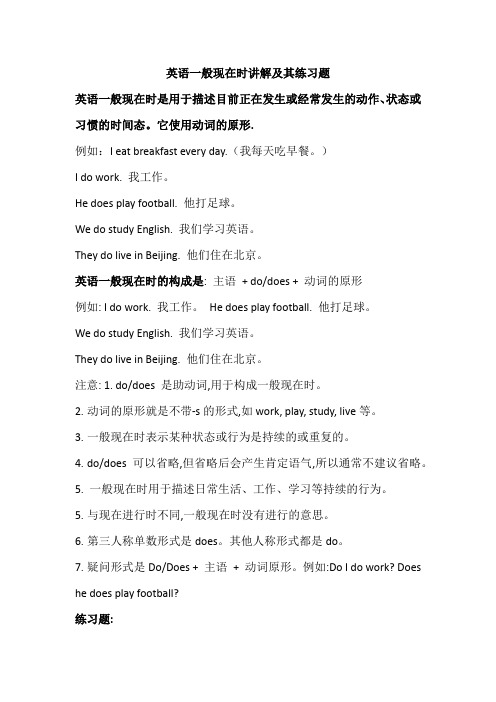
英语一般现在时讲解及其练习题英语一般现在时是用于描述目前正在发生或经常发生的动作、状态或习惯的时间态。
它使用动词的原形.例如:I eat breakfast every day.(我每天吃早餐。
)I do work. 我工作。
He does play football. 他打足球。
We do study English. 我们学习英语。
They do live in Beijing. 他们住在北京。
英语一般现在时的构成是: 主语+ do/does + 动词的原形例如: I do work. 我工作。
He does play football. 他打足球。
We do study English. 我们学习英语。
They do live in Beijing. 他们住在北京。
注意: 1. do/does 是助动词,用于构成一般现在时。
2.动词的原形就是不带-s的形式,如work, play, study, live等。
3.一般现在时表示某种状态或行为是持续的或重复的。
4.do/does 可以省略,但省略后会产生肯定语气,所以通常不建议省略。
5. 一般现在时用于描述日常生活、工作、学习等持续的行为。
5.与现在进行时不同,一般现在时没有进行的意思。
6.第三人称单数形式是does。
其他人称形式都是do。
7.疑问形式是Do/Does + 主语+ 动词原形。
例如:Do I do work? Does he does play football?练习题:一.请改正下列句子中的语法错误并将其变为一般现在时:1.She always drink tea in the morning. -She always drinks tea in the morning.2.They don't likes to eat spicy food. - They don't like to eat spicy food.3.He go to school by bus every day. - He goes to school by bus every day.4. I usually listen music while I work. -I usually listen to music while I work.5.We doesn't have any plans for tonight. - We don't have any plans for tonight.二.请改正下列句子中的语法错误并将其变为一般现在时:1. She always drink tea in the morning. -She always drinks tea in the morning.2. They don't likes to eat spicy food. - They don't like to eat spicy food.3. He go to school by bus every day. - He goes to school by bus every day.4. I usually listen music while I work. -I usually listen to music while I work.5. We doesn't have any plans for tonight. - We don't have any plans for tonight.三.用动词正确的形式填空:1. She ___________ (watch) TV every evening. Answer: watches2. They ___________ (play) basketball on Saturdays. Answer: play3. He usually ___________ (get up) at 6 o'clock in the morning. Answer:gets up4. My sister and I ___________ (like) to read books before bed. Answer: like5. The sun ___________ (rise) in the east and sets in the west. Answer: rises6. We always ___________ (have) lunch at noon. Answer: have7. Tom often _________(go )to the gym after work Answer : goes8 .My mother _________(cook )delicious meals for us Answer : cooks9.He __________ (play) basketball every weekend. Answer: plays10.The cat __________ (run) after the mouse. Answer: runs11. She usually __________ (eat) breakfast at 7 o'clock. Answer: eats12. My sister always __________ (drink) coffee in the morning. Answer: drinks13. Tom often __________ (study) English for two hours every day. Answer: studies四. 请改正下面每个句子的错误,并将其改写成一般现在时。
一般现在时讲解及练习题
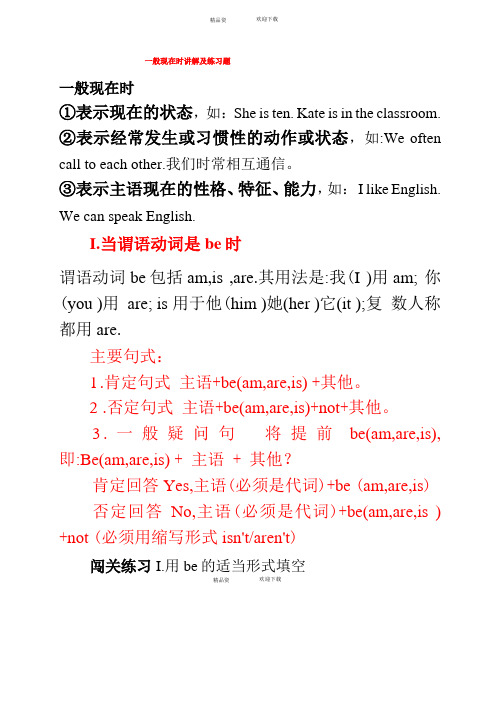
欢迎下载一般现在时讲解及练习题一般现在时①表示现在的状态,如:She is ten. Kate is in the classroom. ②表示经常发生或习惯性的动作或状态,如:We often call to each other.我们时常相互通信。
③表示主语现在的性格、特征、能力,如: I like English. We can speak English.I.当谓语动词是be 时谓语动词be 包括am,is ,are.其用法是:我(I )用am; 你(you )用 are; is 用于他(him )她(her )它(it );复 数人称都用are.主要句式:1 .肯定句式 主语+be(am,are,is) +其他。
2 .否定句式 主语+be(am,are,is)+not +其他。
3 .一般疑问句 将提前be(am,are,is), 即:Be(am,are,is) + 主语 + 其他?肯定回答Yes,主语(必须是代词)+be (am,are,is )否定回答No,主语(必须是代词)+be(am,are,is )+not (必须用缩写形式isn't/aren't )闯关练习I.用be 的适当形式填空欢迎下载 精品资 精品资1.---How you? ---I fine.2.I David,and my family name Green.3.---What color your clock? ---It white.4.---What this in English?---It an apple.5.Toy my brother.David mybrother,too.They my brothers.6.Look!These apple trees.7.We good students and you good teacher.8.My sister and my brother students.9.Five and three eight.10.your card number 5578?11.Where your pencils?12.These sweaters fifty dollars.13.How much his jacket?14.My brother,s birthday December 11th.15.When Kate,s birthday?II.将下面的句子变成一般疑问句并作出回答1.That is my football.2.Those are his books.3.Jim and Tom are good friends.4.My birthday is November 1st.欢迎下载精品资5.His son is twelve years old.111.将下面的句子变成否定句1.His card is on the table.2.There is some water in the bottle.3.Bob and Tony are our friends.4.There are thirty-five students in the classroom.5.The girl is his sister.II.当谓语动词是实义动词时1.当主语是第一人称(I \ we );第二人称(you)及复数时主要句式:(1)肯定句主语+实义动词+其他(2)否定句主语+don’t+实义动词+其他(3)一般疑问句Do+主语+实义动词+其他肯定回答:Yes,主语(必须是人称代词)+do. 否定回答:No,主语(必须是人称代词)+don’t.2.当主语是第三人称单数he, she, it及单数的名词时,主要句式:(1)肯定句:主语+实义动词的第三人称单数形式+其他一(2)否定句:主语+doesn’t+实义动词的原形+ 其他一欢迎下载精品资(3)一般疑问句Does +主语+实义动词的原形+其他肯定回答:Yes,主语(必须是人称代词)+does否定回答:No,主语(必须是人称代词)+doesn’t 动词第三人称单数形式变化规则:特殊变化have----has一、一般情况加s,例如:looks, likes, wants, plays,二、以ch, sh, s, x或o结尾的词,加-es,例如:teaches, washes, guesses, goes, does三、辅音字母+y结尾,变y为i力口-es,例如:carr yf carries, stud y f studies闯关练习I/将下面的句子变成一般疑问句并作出回答1.1h ave a baseball.2.Meria likes apples very much.3.He plays Ping-pang every day.4.We watch TV in the evening.5.Mr Wang often buys lots of things.6. Jane and Mary go to school at 7:30.II.将下面的句子变成否定句1.1n eed a bag for sport.2.He wants to go to a movie.3.She often goes to see Beijing Opera.欢迎下载精品资4.The girl has an egg for breakfast.5.We play basketball every day.6.My teacher knows my name.7.It sounds very interesting.IV.用所给词的适当形式填至1. her sister(have) a tennis racket?2.your friend(like) basketball?3.We(play) football every day.4.It(sound) very well.5.Jim(want) an orange.7.My mother(watch)TV in the evening.8. you(like) English?9. Mike and Li Lei(not like) eggs.10.What color your sister(like)?11. She(know) a little English.改写句子1.Do you often play football after school?(肯定回答)2.I have many books.(改为否定句)3.Gao Shan's sister likes playing tab改为否定句)欢迎下载4. She lives in a small town near New York. 疑问句)5. I watch TV every day.(改为一般疑问句)6. David has a goal.(改为一般疑问句)7. We have four lessons.(否定句)8. Nancy doesn't run f 肯定句)9. My dog runs fast.否定句:10. Mike has two letters for him.一般疑问句:I usually play football on Friday afternoon.一般疑问句: 精品资 (改为一般。
初中中考英语知识点总结初中英语主要时态系列(一)—— 一般现在时讲解及练习

一、一般现在时有三种形式1. 谓语是be(am/is/are)的一般现在时。
①肯定形式:主语+be+表语(形容词、名词充当表语)。
I am hungry.You are beautiful.He is a doctor.②否定形式:主语+be+not+表语(形容词、名词充当表语)。
I am not hungry.You aren't beautiful.He isn't a doctor.③一般疑问句形式:Be+主语+表语(形容词、名词充当表语)? 肯定回答:Yes,主语+be. 否定回答:No, 主语+ be+not.—Are you hungry?—Yes,I am./No,I'm not.—Is he a doctor?—Yes, he is./No, he isn,t.④特殊疑问句形式:特殊疑问词+Be开头的一般疑问句?—What is he?—He is a doctor.注意:be要随着主语变。
2. 谓语动词是实义动词(及物动词或不及物动词)的一般现在时。
①肯定形式:“主语+及物动词+宾语”或“主语+不及物动词”。
She has a little brother.她有一个弟弟。
The sun rises in the east.太阳从东方升起。
②否定形式:“主语+don't/doesn't+及物动词+宾语”或“主语+don't/doesn't+不及物动词”。
She doesn't have a little brother.她没有弟弟。
I don't eat every morning.我每天早晨都不吃饭。
③一般疑问句形式:“Do/Does+主语+及物动词原形+宾语”或“Do/Does+主语+不及物动词原形”。
肯定回答:Yes,主语+do/does. 否定回答是:No, 主语+ don't/doesn't.—Do you eat every morning?—Yes, I do./No, I don't.—Does she have a little brother?—Yes, she does./No, she doesn't.④特殊疑问句:特殊疑问词+do/does开头的一般疑问句?What do you like?When do you go to school?注意:根据主语确定用do还是does。
(完整)一般现在时讲解与练习(初中英语)
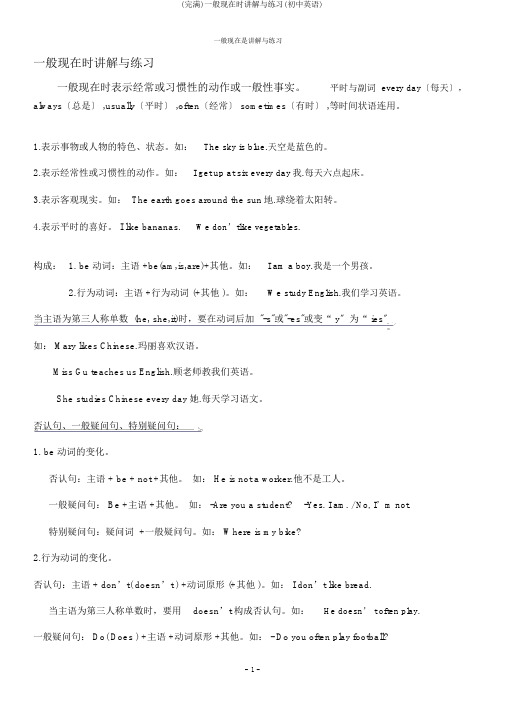
一般现在是讲解与练习一般现在时讲解与练习一般现在时表示经常或习惯性的动作或一般性事实。
平时与副词 every day〔每天〕,always〔总是〕 ,usually〔平时〕 ,often〔经常〕 sometimes〔有时〕 ,等时间状语连用。
1.表示事物或人物的特色、状态。
如:The sky is blue.天空是蓝色的。
2.表示经常性或习惯性的动作。
如:I get up at six every day我.每天六点起床。
3.表示客观现实。
如: The earth goes around the sun地.球绕着太阳转。
4.表示平时的喜好。
I like bananas.We don’tlike vegetables.构成: 1. be 动词:主语 +be(am,is,are)+其他。
如:I am a boy.我是一个男孩。
2.行为动词:主语 +行为动词 (+其他 )。
如:We study English.我们学习英语。
当主语为第三人称单数 (he, she,it)时,要在动词后加 "-s"或"-es"或变“ y〞为“ ies〞如: Mary likes Chinese.玛丽喜欢汉语。
Miss Gu teaches us English.顾老师教我们英语。
She studies Chinese every day她.每天学习语文。
否认句、一般疑问句、特别疑问句:1. be 动词的变化。
否认句:主语 + be + not +其他。
如: He is not a worker.他不是工人。
一般疑问句: Be +主语 +其他。
如: -Are you a student?-Yes. I am. / No, I’m not.特别疑问句:疑问词 +一般疑问句。
如: Where is my bike?2.行为动词的变化。
否认句:主语 + don’t( doesn’t ) +动词原形 (+其他 )。
初中语法重点:一般现在时的用法和练习详解附解析
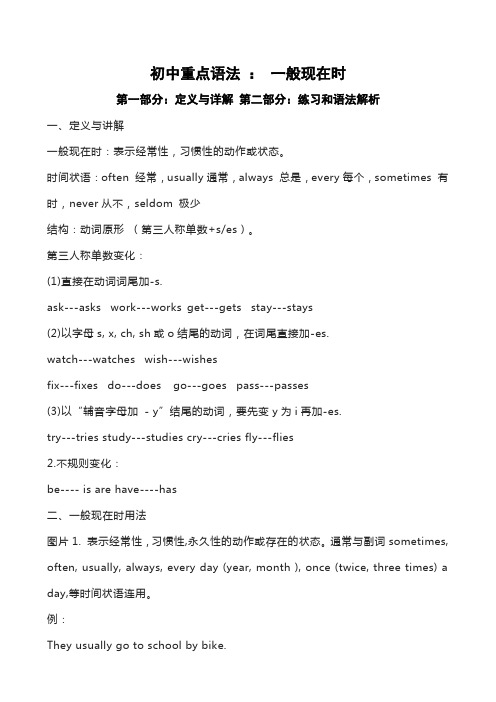
初中重点语法:一般现在时第一部分:定义与详解第二部分:练习和语法解析一、定义与讲解一般现在时:表示经常性,习惯性的动作或状态。
时间状语:often 经常,usually通常,always 总是,every每个,sometimes 有时,never从不,seldom 极少结构:动词原形(第三人称单数+s/es)。
第三人称单数变化:(1)直接在动词词尾加-s.ask---asks work---works get---gets stay---stays(2)以字母s, x, ch, sh或o结尾的动词,在词尾直接加-es.watch---watches wish---wishesfix---fixes do---does go---goes pass---passes(3)以“辅音字母加- y”结尾的动词,要先变y为i再加-es.try---tries study---studies cry---cries fly---flies2.不规则变化:be---- is are have----has二、一般现在时用法图片1. 表示经常性,习惯性,永久性的动作或存在的状态。
通常与副词sometimes, often, usually, always, every day (year, month ), once (twice, three times) a day,等时间状语连用。
例:They usually go to school by bike.I take the medicine three times a day.She helps her mother once a week.Mary’s father is a policeman.There are 50 students in my class.2. 表示客观真理,科学原理,自然现象,等客观事实或格言,谚语等。
例:The sun rises in the east and sets in the west every day.Tomorrow is Tuesday.三、一般现在时的句型转换(1)当句子中有be动词或情态动词时,则把be动词或情态动词(can,could等等)提到主语的前面变成疑问句;在be动词或情态动词后面加not变成否定句.例:①陈述句:She is a student.疑问句→Is she a student?否定句→She is not a student.②陈述句:I can swim.疑问句→Can you swim?否定句→I can not swim.(2) 当句子中即没有be动词,也没有情态动词时,则在主语前加助动词do (you,以及复数), does(单数she,he,it)变成问句;在主语后谓语动词前加助动词don’t(I,you,以及复数), doesn’t(单数she,he,it)变成否定句,助动词后的动词要变成动词原形。
(word完整版)初中英语七年级一般现在时、频度副词讲解及练习(2)

Unit 2 Daily life Grammar课堂练习一、一般现在时讲解及练习基本用法(1)一般现在时常表示经常发生的动作或经常存在的状态如: I go to school every day.表示此状态时,常和always, often, usually, everyday, sometimes等表示时间的状语连用,有时候时间状语可以不表示出来。
(2)表日常行为:如:The boy wake up at seven a'clock,wash ,dress quickly and run into the dining room for breakfast. They wait until they hear the bell and then go to school.(3)表习惯,能力等:如:Do you drive, Mike?(4)表客观存在:如:Fire burns火会燃烧(表客观事实)The earth moves round the sun.地球围绕太阳旋转(表客观真理)练习题:1. Tom is a worker. He _____ in a factory. His sisters _____ in a hospital.A. work/ workB. works/ workC. work/ works2. Who _____ English best in your class?A. speakB. speaksC. speaking3. Mrs. Read _____ the windows every day.A. is cleaningB. cleanC. cleans4. We _____ music and often _____ to music.A. like/ listenB. likes/ listensC. like/ are listening5. She _____ up at six in the morning. A. get B. gets C. getting6. On Sunday he sometimes _____ his clothes and sometimes _____ some shopping.A. wash/ doB. is washing/ is doingC. washes/ does7. The twins(双胞胎)usually _____ milk and bread for breakfast, but Jim _____ some coffee for it.A. have/ haveB. have/ hasC. has/ have8.Jenny ____ in an office. Her parents ____in a hospital.A work worksB works workC work are workingD is working work9. One of the boys_____ a black hat.A haveB there isC there areD has10. We will go shopping if it____ tomorrow.A don't rain Bdidn't rain Cdoesn't rain Disn't rain11. He said the sun ____in the east and ____in the west.A rose; setB rises; setsC rises, setD rise; sets12. Wang Mei ____ music and often ____ to music.A like; listenB likes; listensC like; are listeningD liking ; listen13. Jenny____ English every evening.A has studyB studiesC studyD studied14. She _____ up at six in the morning.A. getB. getsC. getting15.The students will go to the Summer Palace if it _____ tomorrow. A.don't rain B. doesn't rain C. won't rain16. The picture _______ nice.A. looksB.is lookedC. lookD.is looking17. Don't smoke until the plane ______ off.A. takes B .took C. was taken D.is take18. John is always ______ others.A. helpB. helpingC. helpsD. to help19. You'd better ______ at home and ______ your homework.A. to stay, doB. stay, doC. to stay, to doD. stay, to do20. Uncle Wang knows _______ a washing machine.A. how to makeB. to makeC. how makingD. what to make21. My father always __________(come) back from work very late.22. The teacher is busy. He __________ (sleep) six hours a day.23. Listen! Joan __________(sing) in the classroom. She often __________ (sing) there.24. __________ your brother __________(know) Japanese?25. Where __________ you __________ (have) lunch every day?26. The girl __________(like) wearing a skirt. Look! She __________(wear) a red skirt today.二、频度副词、短语用法及练习一般现在时常常与always, usually, often, sometimes, seldom, hardly, never等频度副词连用,表示动作发生的频率。
(完整)初一英语一般现在时讲解及练习
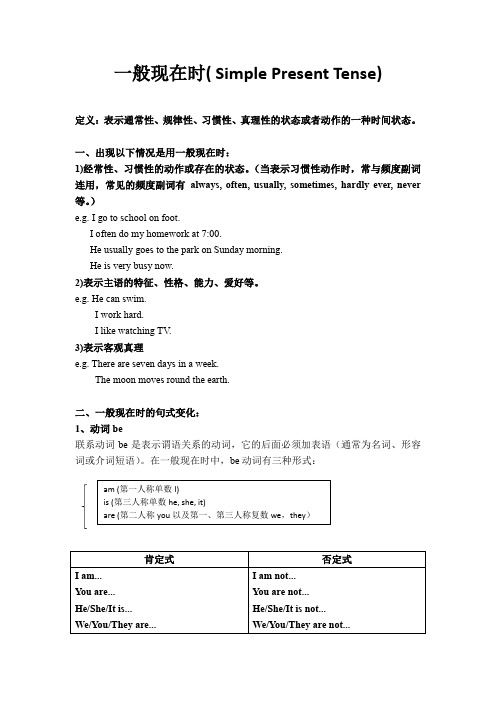
一般现在时( Simple Present Tense)定义:表示通常性、规律性、习惯性、真理性的状态或者动作的一种时间状态。
一、出现以下情况是用一般现在时:1)经常性、习惯性的动作或存在的状态。
(当表示习惯性动作时,常与频度副词连用,常见的频度副词有 always, often, usually, sometimes, hardly ever, never 等。
)e.g. I go to school on foot. I often do my homework at 7:00.He usually goes to the park on Sunday morning. He is very busy now.2)表示主语的特征、性格、能力、爱好等。
e.g. He can swim.I work hard. I like watching TV . 3)表示客观真理e.g. There are seven days in a week.The moon moves round the earth.二、一般现在时的句式变化: 1、动词be联系动词be 是表示谓语关系的动词,它的后面必须加表语(通常为名词、形容词或介词短语)。
在一般现在时中,be 动词有三种形式:一、用be的适当形式填空1.---How____ you? ---I____ fine.2.I___ David,and my family name___ Green.3.---What color ___ your clock? ---It___ white.4.---What___ this in English?---It___ an apple.5.Toy___my brother.David____my brother,too.They ___ my brothers.6.Look!These____apple trees.7.We____ good students and you____ good teacher.8.My sister and my brother_____ students.9. _____there many eggs in the kitchen?10.____your card number 5578?11.Where_____ your pencils?12.These sweaters ______ fifty dollars.13.How much ____ his jacket?14.My brother’s birthday____ December 11th.15.When _____ Kate’s birthday?16、There_____a boy and two girls beside the gate.17、Five and three ____ eight.二、.将下面的句子变成一般疑问句。
【英语】英语一般现在时解题技巧讲解及练习题(含答案)含解析
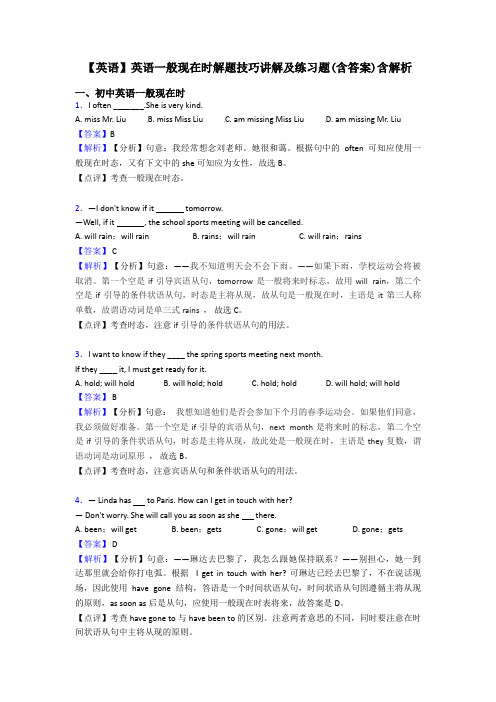
【英语】英语一般现在时解题技巧讲解及练习题(含答案)含解析一、初中英语一般现在时1.I often _______.She is very kind.A. miss Mr. LiuB. miss Miss LiuC. am missing Miss LiuD. am missing Mr. Liu【答案】B【解析】【分析】句意:我经常想念刘老师。
她很和蔼。
根据句中的often可知应使用一般现在时态,又有下文中的she可知应为女性,故选B。
【点评】考查一般现在时态。
2.—I don't know if it tomorrow.—Well, if it , the school sports meeting will be cancelled.A. will rain;will rainB. rains;will rainC. will rain;rains【答案】 C【解析】【分析】句意:——我不知道明天会不会下雨。
——如果下雨,学校运动会将被取消。
第一个空是if引导宾语从句,tomorrow是一般将来时标志,故用will rain,第二个空是if引导的条件状语从句,时态是主将从现,故从句是一般现在时,主语是it第三人称单数,故谓语动词是单三式rains,故选C。
【点评】考查时态,注意if引导的条件状语从句的用法。
3.I want to know if they ____ the spring sports meeting next month.If they ____ it, I must get ready for it.A. hold; will holdB. will hold; holdC. hold; holdD. will hold; will hold【答案】 B【解析】【分析】句意:我想知道他们是否会参加下个月的春季运动会。
如果他们同意,我必须做好准备。
第一个空是if引导的宾语从句,next month是将来时的标志,第二个空是if引导的条件状语从句,时态是主将从现,故此处是一般现在时,主语是they复数,谓语动词是动词原形,故选B。
一般现在时讲解与练习

一般现在时Present Tense一、概念:表示通常性、规律性、习惯性的状态或者动作(有时间规律发生的事件)的一种时间状态。
拆开来讲就是:时间:指动作发生在“现在”的时间段内。
那么,多长的时间才叫“现在”呢?一天?状态:一般现在时最容易迷惑的一个问题,就是拿不准什么叫“经常发生的动作或存在的状态”?这个问题要分三层来讲:1.“经常发生的动作”,比如每天起床、吃饭、上学,一个星期去几次超市或新华书店等。
这些事件中,有的是有规律的,有的是偶尔做几次。
这些都算经常发生的事件。
我们要告诉人们的,是这个动作经常发生,是一般的情况而不是具体的某一次。
2.事物存在的状态。
3.有些动作或状态是永恒的,比如长江向东流、地球绕着太阳转,比如谚语中举的事例、文学作品中描绘的事例,像“好马不吃回头草”等等二、基本用法:1.表示经常性或习惯性发生的动作。
如:I always get up at 7 o’clock in the morning.我总是在早上7点起床。
We often read books at school.我们在学校经常看书。
They usually have dinner at 6:00 in the evening.他们通常在晚上6点吃晚餐。
2.表示现在的状态或特征。
如:She loves English very much.她非常爱英语。
We are always at home on weekends.周末我们总留在家。
Tom is an exellent player.汤姆是一位优秀的运动员。
3.表示客观的现实。
如:The sun rises in the east.太阳从东方升起。
Summer comes after spring.夏天在春天的后面4.用在按计划、规定或安排发生的事情。
如:The plane leaves at 9:30.飞机9点30分起飞。
Tomorrow is Sunday.明天是星期天。
初中语法一般现在时和现在进行时讲解、练习含答案
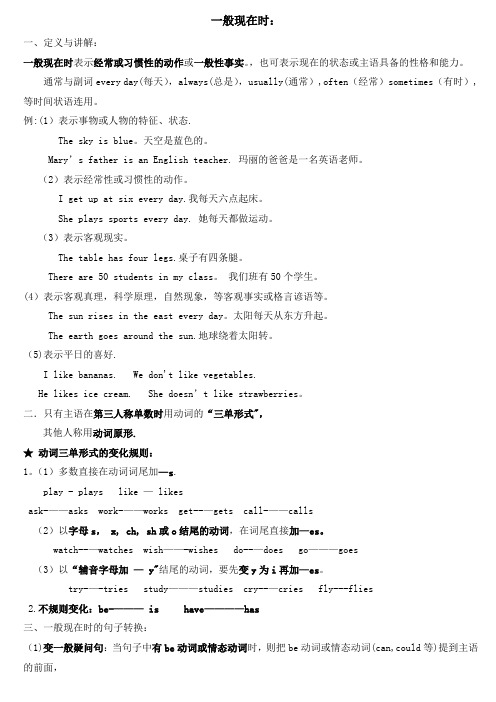
一般现在时:一、定义与讲解:一般现在时表示经常或习惯性的动作或一般性事实。
,也可表示现在的状态或主语具备的性格和能力。
通常与副词every day(每天),always(总是),usually(通常),often(经常)sometimes(有时),等时间状语连用。
例:(1)表示事物或人物的特征、状态.The sky is blue。
天空是蓝色的。
Mary’s father is an English teacher. 玛丽的爸爸是一名英语老师。
(2)表示经常性或习惯性的动作。
I get up at six every day.我每天六点起床。
She plays sports every day. 她每天都做运动。
(3)表示客观现实。
The table has four legs.桌子有四条腿。
There are 50 students in my class。
我们班有50个学生。
(4)表示客观真理,科学原理,自然现象,等客观事实或格言谚语等。
The sun rises in the east every day。
太阳每天从东方升起。
The earth goes around the sun.地球绕着太阳转。
(5)表示平日的喜好.I like bananas. We don't like vegetables.He likes ice cream. She doesn’t like strawberries。
二.只有主语在第三人称单数时用动词的“三单形式",其他人称用动词原形.★动词三单形式的变化规则:1。
(1)多数直接在动词词尾加—s.play - plays like — likesask-——asks work-——works get--—gets call-——calls(2)以字母s, x, ch, sh或o结尾的动词,在词尾直接加—es。
watch--—watches wish——-wishes do--—does go———goes(3)以“辅音字母加— y"结尾的动词,要先变y为i再加—es。
必备英语一般现在时技巧全解及练习题(含答案)

必备英语一般现在时技巧全解及练习题(含答案)一、初中英语一般现在时1.We will go to Tian'anmen Square to watch the raising of the national flag if it tomorrow.A. will rainB. rainsC. doesn't rainD. won't rain 【答案】 C【解析】【分析】主句用一般将来时.if引导的条件状语从句用一般现在时态,即“主将从现”,故选C。
句意是:如果明天不下雨我们将去天安门广场看升旗。
【点评】本题考查if 引导的条件状语从句,主句用将来时,从句用一般现在时。
2.My father is a tea lover. He __________ tea every day.A. drinkB. drinksC. drankD. will drink【答案】 B【解析】【分析】句意:我爸爸是一个茶痴,他每天都喝茶。
every day表明时态是一般现在时,主语是he,所以drink用drinks,C是一般过去时;D是一般将来时,故选B。
【点评】考查一般现在时,注意平时识记其标志词及动词的单三式。
3.I don't know if he tomorrow. If he , I'll call you at once.A. comes, comesB. will come; comesC. will come, will come【答案】 B【解析】【分析】句意:我不知道他明天是否回来。
如果他来,我会马上打电话给你。
第一个空,根据tomorrow,可知宾语从句是时态是一般将来时,第二个空是if 引导的条件状语从句,时态是主将从现,故此处是一般现在时,故选B。
【点评】考查宾语从句,注意一般将来时的用法。
4.Our Geography teacher told us that the Earth ____________ the sun.A. went aroundB. goes aroundC. is going aroundD. was going around【答案】 B【解析】【分析】句意:我们的地理老师告诉我们地球绕着太阳转。
一般现在时讲解及练习
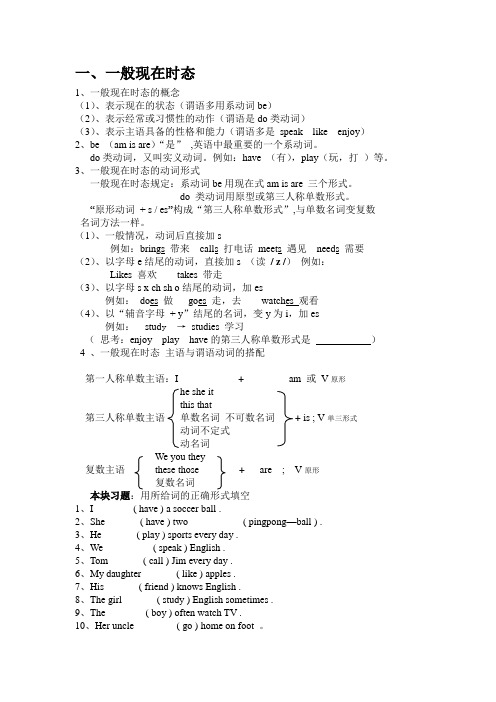
一、一般现在时态1、一般现在时态的概念(1)、表示现在的状态(谓语多用系动词be)(2)、表示经常或习惯性的动作(谓语是do类动词)(3)、表示主语具备的性格和能力(谓语多是speak like enjoy)2、be (am is are)“是”,英语中最重要的一个系动词。
do类动词,又叫实义动词。
例如:have (有),play(玩,打)等。
3、一般现在时态的动词形式一般现在时态规定:系动词be用现在式am is are 三个形式。
do 类动词用原型或第三人称单数形式。
“原形动词+ s / es”构成“第三人称单数形式”,与单数名词变复数名词方法一样。
(1)、一般情况,动词后直接加s例如:brings 带来calls 打电话meets 遇见needs 需要(2)、以字母e结尾的动词,直接加s (读/ z /)例如:Likes 喜欢takes 带走(3)、以字母s x ch sh o结尾的动词,加es例如:does 做goes 走,去watches 观看(4)、以“辅音字母+ y”结尾的名词,变y为i,加es例如:stud y →studies 学习(思考:enjoy play have的第三人称单数形式是)4 、一般现在时态主语与谓语动词的搭配第一人称单数主语:I +am 或V原形he she itthis that第三人称单数主语单数名词不可数名词+ is ; V单三形式动词不定式动名词We you they复数主语these those + are ; V原形复数名词本块习题:用所给词的正确形式填空1、I _______ ( have ) a soccer ball .2、She ______ ( have ) two __________ ( pingpong—ball ) .3、He ______ ( play ) sports every day .4、We ______ ( speak ) English .5、Tom ______ ( call ) Jim every day .6、My daughter ______ ( like ) apples .7、His ______ ( friend ) knows English .8、The girl ______ ( study ) English sometimes .9、The _______ ( boy ) often watch TV .10、Her uncle ______ ( go ) home on foot 。
七年级一般现在时讲解及练习(精)

七年级一般现在时讲解及练习(精)一、一般现在时的定义:(1)表示平时经常发生的事情(2)表示现在的状态如果问同学们你们每天都在干什么?你们会回答:如果问你喜欢英语吗?你会回答:这时我们会用到一般现在时二、将下列主语和谓语动词划出来例子: I do my homework in the evening.1.We have dinner at school.2.She likes pears.3.I go to school at half past six.4.He always jeans and trainers.5.Daming's uncle likes reading and he reads a lot of novels and magazines.总结:当主语为第三人称单数时,谓语动词会发生怎样的变化?三、将下列动词变为第三人称单数形式eat get tay havedo go like playbuy watch make finishlive read listen drinkswim run变法有以下几种情况:(一)一般动词(二)以s,x,sh,ch,辅音字母+o结尾的动词(三)以y结尾的动词有两种情况 A 以元音字母+y结尾的 B 以辅音字母+y结尾的(四)特殊动词have练习:将下列三个句子做主语替换练习(将主语分别替换为 he, she , my sister, Tom, they , my parents ...)1.I like reading.2 We speak Chinese.3 She goes to school every day.四、将下列句子变为一般疑问句及否定句并观察其变法I often get up at six o'clock.Do you often get up at six o'clock ?I don't often get up at six o'clock.1.We play football in the afternoon.2.I usually send emails to my friend.3.They4.Tom and Tony have breakfast at home.5.I live in China.总结:当主语为第一、二人称或第三人称复数时,一般疑问句变法:否定句变法五、将下列句子变为一般疑问句及否定句并观察其变法She wears silk shirts.Does she wear silk shirts? She doesn't wear silk shirts.1 He usually listens to music.2 She gets up early.3 My brother likes maths.4 The boy runs in the morning.总结:当主语为第三人称单数时,一般疑问句变法为:否定句变法为:综合练习:一、用所给动词的正确形式填空1 The camel __________( eat ) grass.2 They ________( live) in the desert.3 I ________( like ) playing basketball.4 My aunt usually _________( make) a cake.5 She often _________( buy ) presents for her family.6 Linda __________( sing ).7 We _________( have ) a great time.8 My friends ____________( like ) birthdays.9 My aunt and uncle usually _____________( remember ) our birthdays.二、用don't和doesn't完成句子1 Daming and Lingling ____________( not have ) lunch at home.2 Daming _________( not drink ) Coke.3 They ________________(not read ) magazines.5 Betty _______________( not watch ) TV in the evening.三、分别用do和does写出一般疑问句并回答you , go to bed, at half past ten ?Do you go to bed at half past ten ? Yes, I do. / No, I don't.2 she , like, English5 your mother , watch TV, in the evening?6 your teacher , speak English ?。
一般现在时态讲解与练习
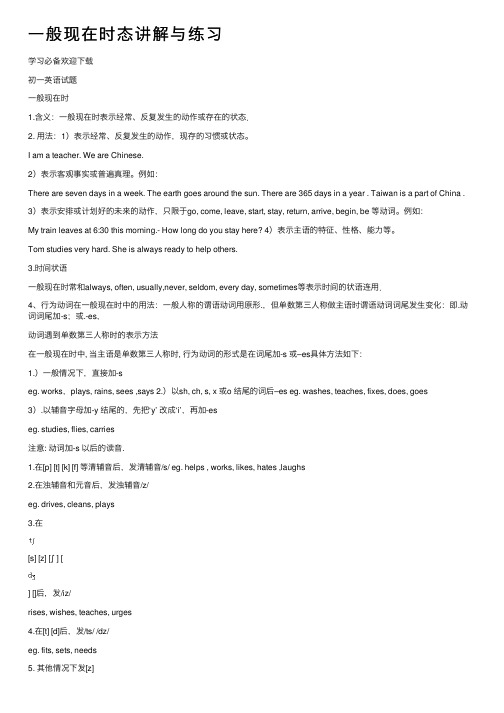
⼀般现在时态讲解与练习学习必备欢迎下载初⼀英语试题⼀般现在时1.含义:⼀般现在时表⽰经常、反复发⽣的动作或存在的状态.2. ⽤法:1)表⽰经常、反复发⽣的动作,现存的习惯或状态。
I am a teacher. We are Chinese.2)表⽰客观事实或普遍真理。
例如:There are seven days in a week. The earth goes around the sun. There are 365 days in a year . Taiwan is a part of China . 3)表⽰安排或计划好的未来的动作,只限于go, come, leave, start, stay, return, arrive, begin, be 等动词。
例如:My train leaves at 6:30 this morning.- How long do you stay here? 4)表⽰主语的特征、性格、能⼒等。
Tom studies very hard. She is always ready to help others.3.时间状语⼀般现在时常和always, often, usually,never, seldom, every day, sometimes等表⽰时间的状语连⽤.4、⾏为动词在⼀般现在时中的⽤法:⼀般⼈称的谓语动词⽤原形.,但单数第三⼈称做主语时谓语动词词尾发⽣变化:即.动词词尾加-s;或.-es,动词遇到单数第三⼈称时的表⽰⽅法在⼀般现在时中, 当主语是单数第三⼈称时, ⾏为动词的形式是在词尾加-s 或–es具体⽅法如下:1.)⼀般情况下,直接加-seg. works,plays, rains, sees ,says 2.)以sh, ch, s, x 或o 结尾的词后–es eg. washes, teaches, fixes, does, goes3).以辅⾳字母加-y 结尾的,先把‘y’ 改成‘i’,再加-eseg. studies, flies, carries注意: 动词加-s 以后的读⾳.1.在[p] [t] [k] [f] 等清辅⾳后,发清辅⾳/s/ eg. helps , works, likes, hates ,laughs2.在浊辅⾳和元⾳后,发浊辅⾳/z/eg. drives, cleans, plays3.在[s] [z] [∫ ] [] []后,发/iz/rises, wishes, teaches, urges4.在[t] [d]后,发/ts/ /dz/eg. fits, sets, needs5. 其他情况下发[z]eg. plans, cries, shows5.否定形式:主语是第三⼈称单数,在⾏为动词前加doesn’t. ⾏为动词变为原形。
七年级英语语法:一般现在时及练习
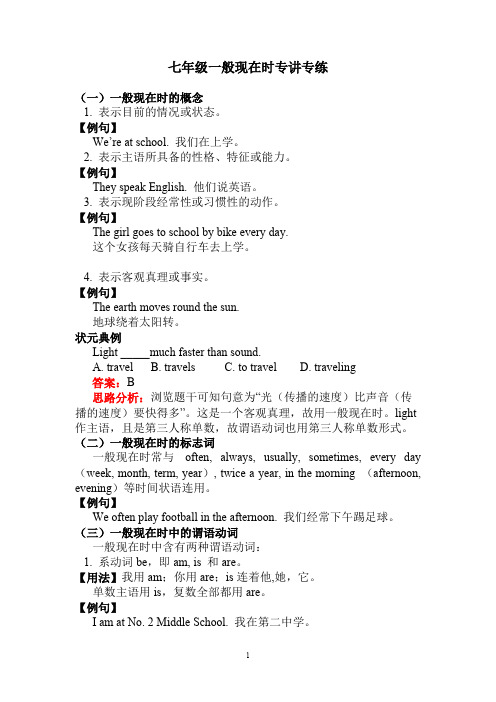
七年级一般现在时专讲专练(一)一般现在时的概念1. 表示目前的情况或状态。
【例句】We’re at school. 我们在上学。
2. 表示主语所具备的性格、特征或能力。
【例句】They speak English. 他们说英语。
3. 表示现阶段经常性或习惯性的动作。
【例句】The girl goes to school by bike every day.这个女孩每天骑自行车去上学。
4. 表示客观真理或事实。
【例句】The earth moves round the sun.地球绕着太阳转。
状元典例Light _____much faster than sound.A. travelB. travelsC. to travelD. traveling答案:B思路分析:浏览题干可知句意为“光(传播的速度)比声音(传播的速度)要快得多”。
这是一个客观真理,故用一般现在时。
light 作主语,且是第三人称单数,故谓语动词也用第三人称单数形式。
(二)一般现在时的标志词一般现在时常与often, always, usually, sometimes, every day (week, month, term, year), twice a year, in the morning (afternoon, evening)等时间状语连用。
【例句】We often play football in the afternoon. 我们经常下午踢足球。
(三)一般现在时中的谓语动词一般现在时中含有两种谓语动词:1. 系动词be,即am, is 和are。
【用法】我用am;你用are;is连着他,她,它。
单数主语用is,复数全部都用are。
【例句】I am at No. 2 Middle School. 我在第二中学。
You are a doctor. 你是一名医生。
It is my cat. 它是我的小猫。
状元典例The boys _____ students.A. amB. isC. areD. be答案:C思路分析:根据主语the boys是复数可知谓语动词应用复数形式。
(完整版)一般现在时的讲解及练习题
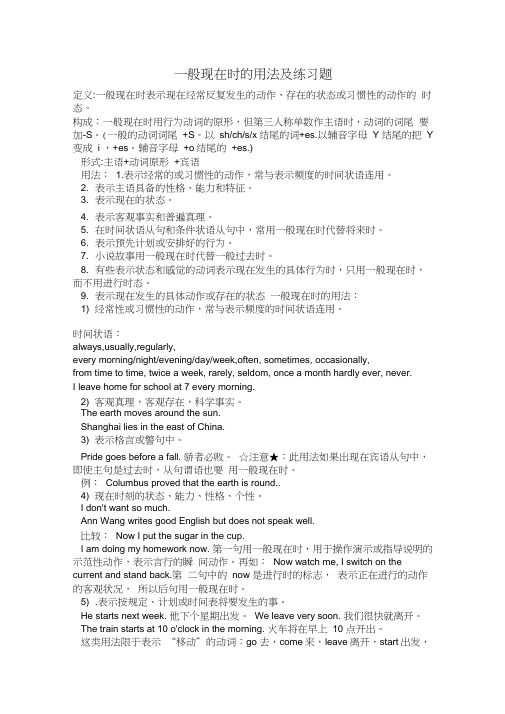
一般现在时的用法及练习题定义:一般现在时表示现在经常反复发生的动作、存在的状态或习惯性的动作的时态。
构成:一般现在时用行为动词的原形,但第三人称单数作主语时,动词的词尾要加-S。
(一般的动词词尾+S。
以sh/ch/s/x结尾的词+es.以辅音字母Y 结尾的把Y 变成i ,+es。
辅音字母+o结尾的+es.)形式:主语+动词原形+宾语用法: 1.表示经常的或习惯性的动作,常与表示频度的时间状语连用。
2. 表示主语具备的性格、能力和特征。
3. 表示现在的状态。
4. 表示客观事实和普遍真理。
5. 在时间状语从句和条件状语从句中,常用一般现在时代替将来时。
6. 表示预先计划或安排好的行为。
7. 小说故事用一般现在时代替一般过去时。
8. 有些表示状态和感觉的动词表示现在发生的具体行为时,只用一般现在时,而不用进行时态。
9. 表示现在发生的具体动作或存在的状态一般现在时的用法:1) 经常性或习惯性的动作,常与表示频度的时间状语连用。
时间状语:always,usually,regularly,every morning/night/evening/day/week,often, sometimes, occasionally,from time to time, twice a week, rarely, seldom, once a month hardly ever, never.I leave home for school at 7 every morning.2) 客观真理,客观存在,科学事实。
The earth moves around the sun.Shanghai lies in the east of China.3) 表示格言或警句中。
Pride goes before a fall. 骄者必败。
☆注意★:此用法如果出现在宾语从句中,即使主句是过去时,从句谓语也要用一般现在时。
例:Columbus proved that the earth is round..4) 现在时刻的状态、能力、性格、个性。
- 1、下载文档前请自行甄别文档内容的完整性,平台不提供额外的编辑、内容补充、找答案等附加服务。
- 2、"仅部分预览"的文档,不可在线预览部分如存在完整性等问题,可反馈申请退款(可完整预览的文档不适用该条件!)。
- 3、如文档侵犯您的权益,请联系客服反馈,我们会尽快为您处理(人工客服工作时间:9:00-18:30)。
初一英语一般现在时讲解及练习Company Document number:WTUT-WT88Y-W8BBGB-BWYTT-19998一般现在时( Simple Present Tense)定义:表示通常性、规律性、习惯性、真理性的状态或者动作的一种时间状态。
一、出现以下情况是用一般现在时:1)经常性、习惯性的动作或存在的状态。
(当表示习惯性动作时,常与频度副词连用,常见的频度副词有 always, often, usually, sometimes, hardly ever, never等。
). I go to school on foot.I often do my homework at 7:00.He usually goes to the park on Sunday morning.He is very busy now.2)表示主语的特征、性格、能力、爱好等。
. He can swim.I work hard.I like watching TV.3)表示客观真理. There are seven days in a week.The moon moves round the earth.二、一般现在时的句式变化:1、动词be联系动词be是表示谓语关系的动词,它的后面必须加表语(通常为名词、形容词或介词短语)。
在一般现在时中,be动词有三种形式:一、用be的适当形式填空you ---I____ fine.David,and my family name___ Green.color ___ your clock ---It___ white.this in English---It___ an apple.brother, ___ my brothers.!These____apple trees.good students and you____ good teacher. sister and my brother_____ students. 9. _____there many eggs in the kitchen card number 5578your pencilssweaters ______ fifty dollars.much ____ his jacketbrother’s birthday____ December 11th._____ Kate’s birthday16、There_____a boy and two girls beside the gate.17、Five and three ____ eight.二、.将下面的句子变成一般疑问句。
1. That is my football.2. Those are his books.3. Jim and Tom are good friends.4. My birthday is November 1st.5. His son is twelve years old.三、将下面的句子变成否定句1. His card is on the table.2. These are my parents.3. Bob and Tony are our friends.4. These things are five dollars.5. The girl is his sister.四、划线提问1. Our teachers are in the classroom.2. The girl’s telephone number is 032-55746.3. Her pen is black.4. September 10th is Teachers′ Day.5. They are thirteen years old.6. The boy is fine.7. The old man is my grandfather.8. These eggs are five yuan.2、实义动词do.1)表示动作,一般人称作主语的,变否定句须在动词前加助动词don’t;变一般疑问句须在句首加助动词do。
.肯定句 They have lunch at 12:00.否定句They don’t have lunch at 12:00.疑问句 Do they have lunch at 12:002)单三人称做主语的,变否定句须在动词前加助动词doesn’t;变一般疑问句须在句首加助动词does。
. 肯定句:He goes to school by bike.否定句:He doesn’t go to school by bike.疑问句:Does he go to school by bike实际操练1. I have many books. (改为否定句)does his homework at home.否定句:一般疑问句:usually waters the flowers.否定句:一般疑问句Yang usually washes some clothes on Saturday.否定句:5. I usually play football on Friday afternoon.否定句:一般疑问句:强化训练一、写出下列单词的第三人称单数形式1. work__________ read__________ clean__________ write__________2. teach__________ wash__________ guess__________ watch__________3. go__________ do___________4. study__________ fly__________ cry__________ play__________5. have__________二.选择( ) 1. _____ you have a book?A. DoB. AreC. IsD. Have( )2. They _________ on a farm.working B. is work C. working D. is worked( ) 3. Does Peter like to watch TV__________.A. Yes, he likeB. No, he doesn’tC. Yes, he’d likeD. No, he likes( )4. She doesn’t __________ her homework in the afternoon.A. doingB. to doC. doesD. do( )5. How ____________ Mr. Brown ___________ to America?A. do, goB. is, goC. does, go()6. Where’s my camera I____________ it.A. am not findingB. am not seeingC. can’t findD. can’t look at( )7. How ___________ he go to work He ___________ to work by bike.A. does; goB. do; goesC. do ; goD. does; goes( )8. ______ you usually late for school No, _____________.A. Do; I amB. Does ;notC. Are ; I’m notD. Are ; I aren’t( )9. _____ she _____ home at six every day?A. Is , leaveB. Does , leaveC. Is , leavesD. Does , left( )10. Mr. Yang ____________ English this term.A. teaches ourB. teaches usC. teachs usD. teach our三.用所给动词的适当形式填空。
1. My classmate ______ (know) the man on the bike.2. His sister usually ______ (go) to school at 7:00 am.3. Lin Tao ______ (like) his new sweater.4. Let me ______ (have) a look.5. Let’s ______ (play) tennis!6. ______ he ______ (like) English?7. I want ______ (go) to a movie.8. He ______ (not know) the teacher’s name.9. Nice ______ (meet) you!10. Can I ______ (ask) the policeman?11. ______ (sit) down and ______ (have) a cup of tea.12. ______ (not look) at your book!13. ______ you ______ (can see) the bananas on the table?14. I need ______ (buy ) some new clothes.15. She likes ______ (play) chess.16. It’s time ______ (play) games.17. You must v (be) a good student.18. She must ______ (sing) well.19. He ______ (have) an egg and a banana for breakfast.20. Li Min ______ (take) a shower after lunch.21. People usually ______ (eat) dinner in the evening.22. What time ______ Mary usually ______ (play) basketball ?23. This boy likes ______ (play) chess with his father on weekends .24. Where ______ his parents ______ (work) now, do you know25. Who ______ (teach) you English in your school?26. Helen, ______ (not be) late for class again.27. I don’t like the movie. It’s ______ (born).28. ______ (not look) at the pictures. ______ (listen) to me.29. Little Tom can ______ (ride) a horse.30. The weather ______ (be ) windy to day.四、改句子you often play football after school (肯定回答)2. He doesn’t have any paper.(改为肯定句)Shan's sister likes playing table tennis (改为否定句)lives in a small town near New York. (改为一般疑问句)watch TV every day. (改为一般疑问句)6 We have four lessons.(否定句)7. Nancy doesn't run fast (肯定句)8. .Mike has two letters for him. (一般疑问句)。
